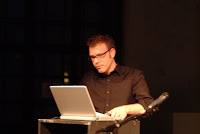Earlier this month I posted a proposal which did not get accepted for further submission and evaluation. I have to really thank Florian for being quite forthright about completely incoherent the first version was, and asking pointed questions that allowed me to see what needed to be straightened out. So I revised and revised and revised, which isn’t always my favorite thing… But this was fun.
If I hadn’t been so pressed for time, I would have enjoyed revising even more, but anyway, thanks to Mirko‘s willingness to spend hours talking me through a revision via Skype, I enjoyed it. Sometimes the hardest part of writing (for me) is just staying at the computer and continuing to write. Having a friend on the line (or in a chat window) really helps. A deep bow to Mirko for that heroic effort. After the extremely helpful feedback from Florian and help with revisions from Mirko and Betsy (one of my colleagues here) I submitted, three drafts later, this:
With the introduction of the Internet and WWW in the 1990s, scholars, artists and activists began a critical engagement with technology. These early adopters were a loose collection of individuals that came out of many fields, including philosophy, literature, film studies, sociology, computer science, and also from outside of the academy; journalists, politicians, artists, activists and business people have participated in this discourse community as well. This diverse group was united by their shared observation of and concern with the effects technology was having on their respective fields.
There were few possibilities then to reflect on new media from a scholarly perspective; instead the issues were debated in popular discourse, in the networks of the early adopters’ various fields, and were explored in conferences and festivals. For example, in 1988 Ars Electronica featured contributions from Kittler, Baudrillard, Flusser, and Weibel, each of whom was trying to elucidate what we now commonly describe as new media. But while early scholarship on new media came from traditional fields such as literature, sociology, art and art history, film and media studies (Hayles, Kittler, Castells, Uricchio, Manovich); recently institutionalization has been driven by former members of the early adopter networks entering academia (Fuller, Lovink, Cramer, Juul, Montfort, Rieder, Schaefer, van den Boomen, Terranova).
As this field and its knowledge are crystallizing, the process raises immediate questions: what is the relation between institutionalization and the people, physical things, and symbols in the networks that gave rise to new media? How are institutions constructed that critically reflect on emerging technologies? How is the fluid knowledge shared between participants becoming crystallized, being canonized, such that some groups are included or excluded? And finally, what do we gain and lose in knowledge production through this process?
Because European countries hosted the first networks and festivals devoted to a critical engagement with new media; has invested far more public funding into cultural and academic programs around it; Europe now has far larger, more varied, and more mature institutions producing, studying, and teaching about new media. This diversity makes it fruitful ground for study, but while some cities, projects, people, or organizations have been studied in isolation by pioneers such as Manuel Castells (The Internet Galaxy), Geert Lovink (Dark Fiber) and provide preliminary insight into the institutionalization of new media, no comprehensive studies have yet appeared. I intend a rhetorical analysis of the scholarly discourse on new media in Europe which I will approach as a dispositif. While Foucault applied this concept to historical archives, I propose exploring the human archive embodied in the actor-network of individuals and groups currently working on new media, beginning in the Netherlands.
The Netherlands is the best starting point because some of the first university programs in new media began there, and thanks to early and extensive government funding, a wide array of other cultural institutions have developed simultaneously. The Dutch context was originally characterized by heterogenous networks of people, things and symbols that were ad hoc and informal, but now all of these disparate elements contribute to the establishment of formal knowledge, specialization, and the construction of a canon. These activities are a clear sign of institutionalization, which also inevitably involves the development of gate-keeping processes. However, while institutionalization is taking place, the cooperative polder model still shapes socio-economic relations and allows for the continued emergence of new voices and new groups. Thus the whole spectrum of development is available for study.
In addition, the development of new media in the Netherlands allows study of other important questions: how are a loose group of people, the early adopters, who were not at first members of the academy, contributing to the creation of a field, a discourse, and knowledge by running events, funding grants and supporting themselves in the process, and how are they molding what started almost as folk practice into official knowledge, bringing not only their experiences, but their networks into the establishment? New media institutions are developing rapidly and successfully in the Netherlands; which conditions are necessary for fostering and speeding this process as it has happened there?
For this study I have begun visiting and observing a variety of groups, including De Waag Society for Old and New Media, V2_Institute, Worm Rotterdam, and De Geuzen artist collective. Further visits to these institutions have been arranged for the award period, along with observations at the University of Utrecht Department for Media and Culture Studies, the Piet Zwart Institute Media Design program, among other academic institutions. Observing this network over time will allow a comprehensive rhetorical analysis, using Burke’s pentad to better understand the functioning of actors within these networks, and will yield a better understanding of how knowledge in an emerging field is institutionalized.

